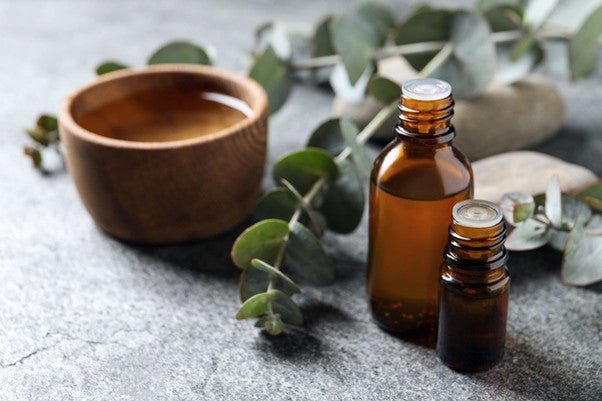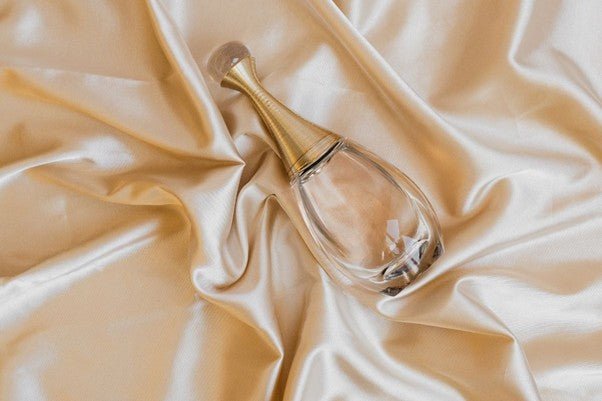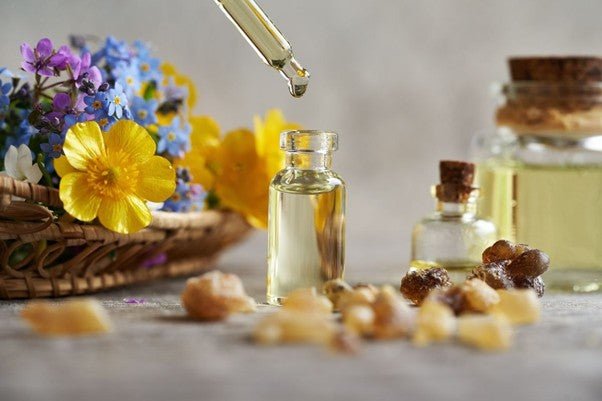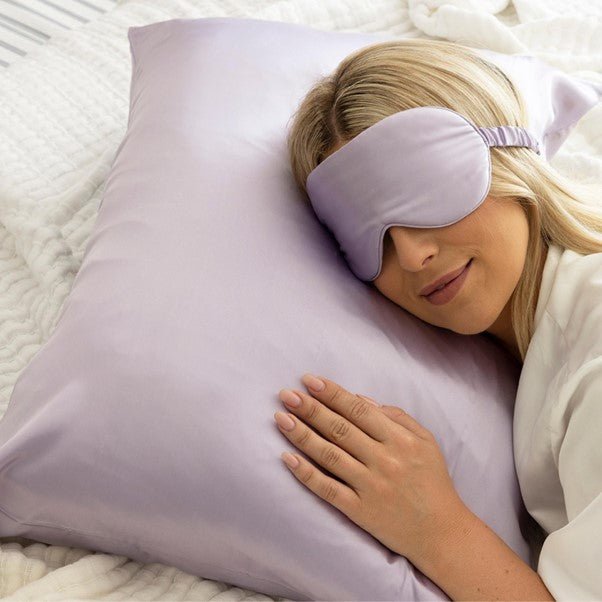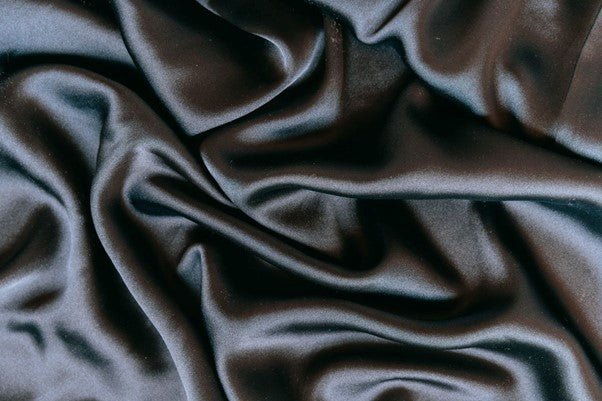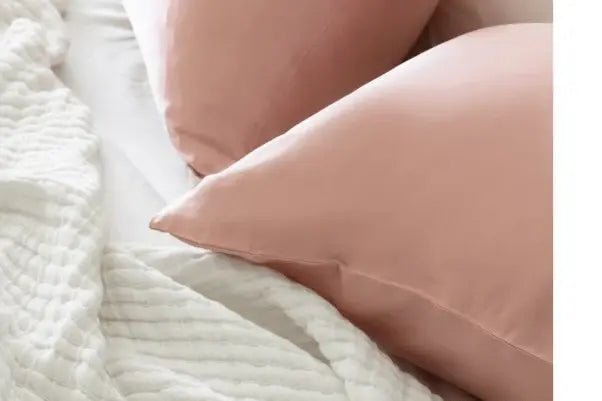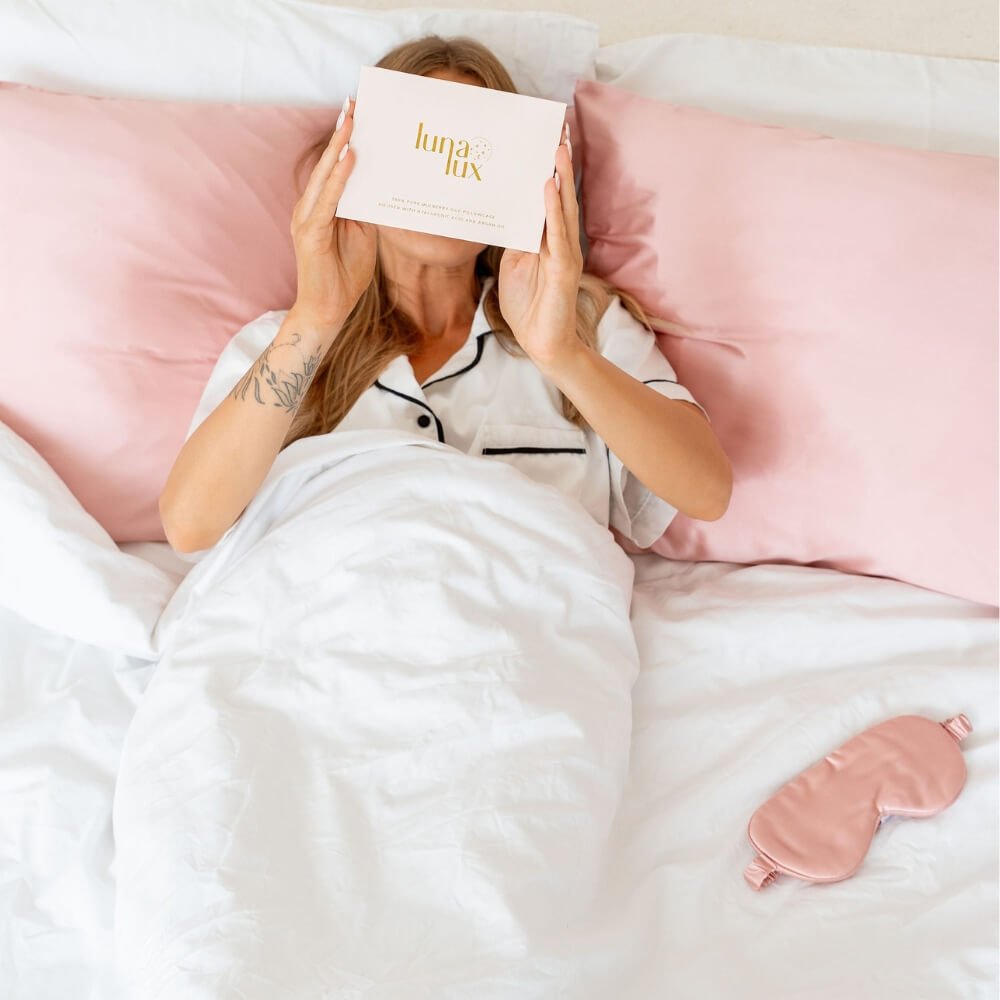Lunalux Blog
Find Your Calm: Essential Oils to Combat Stress and Anxiety
With everything we have to face in today's fast-paced world, life stress levels, and anxiety are becoming an all-too-familiar companion to many individuals. Everything from pressure at work, relationship challenges, and navigating our daily lives can often feel overwhelming and like a momentous task. With so many remedies and methods that we see daily on social media and the internet to combat stress, is there something that is practical and that truly works? Well, thankfully there is a natural stress relief tool that has been around for ages, and trusted by many for its capabilities to combat stress and provide feelings of calm serenity. People use essential oils, a naturally derived and multi-functional natural remedy, for stress and many other ailments. With their soothing scents and therapeutic properties, essential oils can help to promote relaxation, soothe stress and bring a sense of calm to your chaotic life. So let's explore the many functionalities of essential oils, how they work and the various ways in which you can incorporate them into your daily life for their exceptional health benefits. Understanding Stress and Anxiety Before we explore the benefits of essential oils, it’s important to understand what stress and anxiety are and how they affect our bodies and minds. Stress is a natural response that the body creates towards a perceived challenge or situation that it finds threatening. This could include physical, emotional, or environmental factors that affect you as a person. Anxiety, on the other hand, refers to a much more persistent and excessive type of stress, which is usually not tied to specific events or external stressors, but rather triggered by constant worries and fears that are unrelated. What Triggers Stress and Anxiety? Depending on the individual and their capabilities of handling certain challenges and situations, most stress and generalized anxiety disorder triggers are usually the following: Work Pressure - Tight deadlines, high expectations, and workplace conflict can easily lead to stress. Financial and Health Issues - The burden of financial problems or health-related concerns often exacerbates anxiety. Major Life Changes - Moving, losing a loved one, or experiencing a significant life transition can create a sense of instability. Relationship Conflicts - Tensions in personal relationships often contribute to heightened stress levels. Perfectionism and Over Scheduling - Trying to juggle too many tasks or setting unrealistic standards can increase anxiety. It is essential to fully understand your stress and anxiety triggers to be able to manage them appropriately. Now the question beckons: How can essential oils help with stress and anxiety? Though they are not a solution to your problems, they can easily bring some relief to the symptoms of stress, depression and anxiety. The Science Behind Essential Oils An essential oil is an extract from plants that is highly concentrated and known for its therapeutic properties and health benefits. Essential oils contain bioactive compounds that can affect both the body and the mind. When we inhale or apply essential oils, they interact with receptors in our nose that send signals to the brain’s limbic system. This part of the brain is responsible for emotions, memory, and behaviour, making it a key target for aromatherapy. Depending on the essential oil, you can use some topically as a cream or massage oil, or ingest some as a remedy for a specific ailment. About the calming effect of some essential oils, scientific research results in proven evidence of how essential oils can reduce your heart rate, lower blood pressure, and alleviate anxiety symptoms Essential oils can relieve stress and anxiety by influencing the nervous system, helping regulate emotional responses, and promoting relaxation. Top Essential Oils for Stress and Anxiety Relief While many essential oils can help reduce stress and anxiety, some are particularly well-known for their calming properties. Lavender Essential Oil Lavender essential oil is arguably the most popular essential oil for stress and anxiety relief. Lavender's calming and relaxing properties have led to its centuries-long use in alleviating anxiety symptoms. The scent of lavender has a soothing effect on the nervous system, helping to lower blood pressure and reduce heart rate. It’s ideal for promoting relaxation and preparing the body for restful sleep. How to use: Diffusion - Add a few drops of lavender essential oil to a diffuser and inhale deeply for a calming effect. Topical - Dilute with a carrier oil (like almond or jojoba) and apply to pulse points or the back of the neck for instant relief. Inhalation - Inhale directly from the bottle or add a drop to tissue for quick stress relief. Clary Sage Essential Oil Clary Sage is an essential oil that helps to calm the nervous system, which makes it an excellent choice for managing anxiety and stress. It is well known that Clary Sage potently promotes emotional well-being and balances hormones. This makes it exceptionally helpful for individuals who experience stress or anxiety during hormonal fluctuations. How to use: Diffuser - Add a few drops of clary sage to a diffuser to create a relaxing atmosphere. Topical - Mix with a carrier oil and massage onto the abdomen or temples to reduce stress levels. Vetiver Essential Oil People know vetiver essential oil as the grounding and earthing essential oil because of its unique ability to provide tranquillity. It has a strong and earthy aroma that is very effective in promoting emotional balance and relaxation. Vetiver oil is often used in meditation and spiritual practices for its calming effects. Furthermore, it is also an excellent choice for inducing more restful sleep because of its sedative properties. How to use: Diffuser - Add a few drops to an aroma diffuser to create a peaceful atmosphere. Topical - Dilute with a carrier oil and massage onto the back of the neck or feet to calm the mind. Bergamot Essential Oil We derive Bergamot essential oil from the rind of the bergamot orange and offers both calming and uplifting qualities. It has a fresh, citrus and floral aroma that provides a boost to your mood, reduces anxiety and enhances energy levels. Bergamot's essential oil is particularly beneficial for individuals who have milder anxiety disorders and nervous tension. How to use: Diffuser - Diffuse a few drops to create an uplifting atmosphere. Topical - Apply diluted oil to the wrists or temples to ease stress and improve mood. Keep in mind when using any essential oil topically, you must dilute it with a natural carrier oil first, as the oil on its own could irritate the skin. A few of the best carrier oils to use are: Almond Oil. Jojoba Oil. Olive Oil. Coconut Oil. How to Use Essential Oils for Stress and Anxiety Relief You can use essential oils in several ways to alleviate symptoms of anxiety and stress. Here are some of the most popular methods: Topical Application Essential oils can be applied to the skin, however, always first dilute it with a carrier oil. The best areas to apply essential oils for their calming effects are the temples, wrists, or the back of the neck. Topical application allows the skin to absorb the essential oils into the muscles to relieve tension. Similarly, the aroma of the essential oils stays on your skin, which is then inhaled to provide even more calming effects. Aromatherapy Diffusion One of the most popular ways to use essential oils is through diffusion. There are various diffusers available, such as hot or cold diffusers, nebulisers, diffuser reeds, and ultrasonic diffusers. Their purpose is to release a diluted steam or aroma of the essential oil into the air, which you then breathe in. Breathing in a soothing aroma usually has an immediate effect on your mood and a calming effect on the nervous system. An essential oil diffuser is a versatile item that you can use at home, at work, or even in your car. Inhalation Inhalation is similar to diffusion, as you are still breathing in the diluted aroma of the essential oil. However, this is a quicker method that does not require a diffuser or any other gadgets to work. As a quick solution to an anxiety attack or immediate stress, place a few drops of essential oil on a tissue or cotton wool and breathe it in deeply. This method is ideal when you need quick stress relief, or a boost during a busy day. Add to a Warm Bath A warm bath with a few drops of essential oils of your choice is a perfect method to unwind after a stressful day. Along with the warm water, the aroma diffuses into the air which you inhale, and the oils in the warm water absorb into your skin to soothe tense muscles. Aromatherapy Jewelry Another method becoming quite popular is aromatherapy jewellery, which is a portable piece of jewellery with diffuser properties. The pieces of jewellery typically have a small compartment where you place a few drops of pure essential oils or oil that makes it easier to inhale the scent on the go. Best Essential Oil Blends for Stress, Anxiety, and Breathing To make your aromatherapy routine more effective, here are a few examples of other essential oils and oil blends that are natural and soothing: Zea Vetiver Essential Oil Blend Vetiver oil has a smokey and earthy aroma with soothing properties. Because of its grounding scent, it is ideal for spiritual and emotional well-being and used in meditation, relaxation therapy, massages and to assist with sleep difficulties. Vetiver also has anti-inflammatory and anti-bacterial properties. It is often used to promote sleep and relaxation, as well as an aphrodisiac. Zea Calming Lifestyle Blend The Calming Lifestyle blend is a blend of lavender, cedarwood, frankincense and Ylang Ylang essential oils. This blend is ideal for improving sleep, reducing stress and anxiety, and enhancing your overall mood. You can use it in a diffuser or applied topically with a carrier oil. Zea Stress Relief Lifestyle Blend The Stress Relief blend consists of Ylang Ylang, and Patchouli oil, Sweet Orange, Lavender and Bergamot essential oils. It has a more floral and refreshing scent that uplifts your mood and relieves stress. The essential oil is best used diffused or applied topically with carrier oil for immediate relief. Zea Breathe Easy Lifestyle Blend Not essentially a blend of stress, however, it does enhance breathing and provides uplifting properties that aid in stress relief. The Easy Lifestyle blends contain Peppermint, Eucalyptus, Scotch Pine, and Kunzea oils. They are all excellent decongestants and purifiers that help you breathe easily and uplift your spirit. You can use them in a diffuser or apply topically at night to your chest or back. This eases your breathing, which in turn promotes more restful sleep. Final Thoughts Incorporating essential oils into your daily routine can be a powerful tool in managing stress and anxiety. Essential oils are a natural way to help you unwind from a busy day, or just to provide quick relief when you are feeling anxious. When you use essential oils alongside other therapeutic practices and professional advice, they provide exceptional relief for stress and anxiety. Thus, by understanding the various essential oils, their properties, and how to use them, you can easily create a peaceful and calming atmosphere wherever you go. This will lead to a more balanced life and emotional well-being.
Learn moreProtecting Your Silk: Essential Tips for Proper Washing and Maintenance
Silk is a luxurious fabric that exudes elegance, softness, and sheen. However, besides its aesthetic appeal, silk also holds many health benefits for your skin and hair especially, as it is a natural fibre. As a natural fibre, silk is more delicate, requiring special care for it to maintain its beauty and benefits. Therefore, anything from silk garments like blouses and dresses to silk accessories such as pillowcases, scrunchies, and eye masks, this natural fibre deserves special care to maintain its quality and beauty. New to silk or a seasoned collector, understanding proper silk care is essential to prolong its lifespan and preserve its delicate fibres. In this post, we’ll share essential tips for washing, drying, and storing silk items so that you can continue enjoying the beauty and health benefits of your luxurious silk bedding and garments for years to come. What is Natural Silk and How is It Produced? Silk is a natural protein-based fibre that is produced by silkworms. Silkworms spin a cocoon that consists of long, continuous threads. Workers harvest the cocoons and clean them, thereafter they then spin the threads into a silk fabric. The most commonly known and popular natural silk is mulberry silk, which is derived from silkworms that only feed on the leaves of the mulberry tree. The silk fabric has a renowned lustrous sheen and smooth texture, with a delicate nature thus why it's classified as a luxury item. Silk items also offer a unique combination of aesthetic beauty, comfort, durability and health benefits when it's properly cared for. Why is it Necessary to Care for Silk? Silk is a durable fabric, however in contrast is also quite delicate, which means it's easily damaged if not taken care of properly. The finer silk fibres easily become weakened from improper washing, exposure to chemicals, or high heat. Silk fabrics easily lose their lustre and integrity, as well as their colour becomes dull and brittle if not cared for. How Silk is Dyed and Its Colourfastness Because silk absorbs dye differently than synthetic fibres, and other natural fibres, the entire process requires a very delicate balance. It is essential to properly care for and wash silk to ensure that the colour stays vibrant. Silk garments and products not washed and cared for according to their manufacturer's instructions could bleed dye, causing the fabric colour to fade over time. Thus, to maintain the vibrancy of your silk products, it is essential to follow instructions, always use cold water for washing, and never dry your silk in direct sunlight. What are a Few of the Most Popular Silk Products? Silk is widely used to manufacture a variety of products because of its elegant appeal, soft sheer feeling, and health benefits. A few popular silk items include: Silk Garments - Silk is often used to manufacture clothing such as nightgowns, sleepwear and underwear. Silk is also used to manufacture a variety of other garments. Silk is temperature regulation and will not overheat. Similarly, it has a soft luxurious feel against your skin. Silk Pillowcases and Bed Linen - Silk bedding especially silk pillowcases, are gentle on the skin and hair, helping to prevent wrinkles and reduce hair breakage. The smooth texture of silk allows for better moisture retention, preventing dry skin and hair. Silk Hair Scrunchies - These prevent hair breakage and reduce the friction that can lead to frizzy, damaged hair. Silk scrunchies are gentle on the hair fibres, allowing you to style your hair without causing harm. Silk Eye Masks - Silk eye masks are perfect for blocking out light, promoting better sleep, and preventing skin irritation around the delicate eye area. Some silk products are even infused with nourishing ingredients like hyaluronic acid and argan oil, further enhancing the skin and hair benefits. These infused products can provide deep hydration, reduce frizz, and improve the overall health of your skin and hair while you sleep. How to Properly Care for Silk Silk is a luxury and delicate fabric that requires proper care and maintenance for it to maintain its beauty and elegance. Therefore, here are a few tips for caring for your silk items: Preparation Before Washing Check the Fabric Care Label - Always start by reading the care label on your silk garments. The label provides important information about whether you can wash the silk stem at home, or whether to take it for dry cleaning. Use a Silk-Specific Detergent - Choose a gentle detergent specifically designed for washing silk or delicate fabrics. Harsh chemicals, bleach, and fabric softeners can damage the silk fibres and compromise their integrity. Protect the Fabric with a Mesh Laundry Bag - To protect your silk items from tangling or snagging, place them in a mesh laundry bag before washing. This is especially important if you are machine-washing silk garments. How to Wash Silk Garments Hand Wash or Machine Wash - Hand washing is generally the safest method for washing silk, however,r if your washing machine has a delicate cycle it should suffice. Keep in mind that the waters should be either cold or lukewarm, but never hot. Use gentle detergents, ideally those specifically made to wash silk with to ensure they do not cause damage. When washing silk in a machine, it's best to use a laundry bag or wash silk items on their own. Cold Water is Key - Ideally, it's best to first soak silk in cold water, and then wash them in cold or lukewarm water to avoid damaging the delicate fibres. Hot or even warmer water could easily cause the silk to shrink, or cause color changes in the fabric. Avoid Overloading the Washing Machine - Essentially you should wash silk on its own or with other silk items. However, when washing silk with other garments just ensure you do not overload the washing machine, as this can cause friction, or use a laundry bag. Drying and Ironing Silk Lay Flat or Hang Silk Garments - After washing, it’s best to lay your silk garments flat to dry or hang them up. Ensure that you hang the silk items in a shaded area, away from direct sunlight. Excessive exposure to sunlight can cause the colour to fade or the silk to become brittle. Avoid Tumble Drying - Never tumble dry silk as the heat can shrink or damage the delicate silk fibres. Instead, allow the fabric to air dry naturally on a drying rack or by hanging. Iron Silk with Care - Iron silk garments on a low heat setting or silk setting using an ironing board. Always place a clean, white cloth or pressing cloth between the silk and the iron to protect the fabric from heat damage. Never iron silk while it is wet; it should be slightly damp to prevent any burns or watermarks. Removing Stains and Spills from Silk Spot Treatment - For minor stains or spills use a small amount of cool water and a diluted solution of delicate detergent. Always test the solution on an inconspicuous area of the garment before applying it to the stain. Avoid Scrubbing - Be very gentle when treating stains on silk. Avoid rubbing or scrubbing the fabric, as this can damage the fibres and cause the stain to set deeper into the fabric. Tough Stains - For more stubborn stains, it may be best to seek professional dry cleaning. This is particularly important for delicate items like silk pillowcases, where tough stains may require more expertise to remove without harming the fabric. Storing Silk Garments Store Silk Properly - When not in use, store your silk garments in a cool, dry place. Avoid hanging them for long periods, as this can cause the fabric to stretch. Instead, fold them neatly and store them in a breathable cotton bag or another fabric bag to ensure adequate air circulation. Protect Against Moths - To protect your silk garments from clothes moths, use moth-repellent sachets or cedar mothballs in your storage area. These will help keep your silk items safe from damage. Avoid Direct Sunlight - When storing silk, keep your garments away from direct sunlight, as prolonged exposure can cause fading and weaken the silk fibres. Store your silk in a dim, cool area. In Conclusion Caring for silk garments and accessories requires attention to detail, but the rewards are well worth it. Thus, whether you have silk pillowcases, a lovely silk blouse, or even just a silk hair scrunchie, you must follow the correct care techniques and manufacturer's instructions to ensure your silk items maintain their lustrous beauty and functionality. Keep in mind, that silk does not tolerate high temperatures, excessive friction, or harsh chemicals, so use caution when washing soil. Store your silk items in a cool dry place to ensure their luxurious feel and longevity.
Learn moreUnlocking the Power of Argan Oil and Hyaluronic Acid for Glowing Skin and Healthy Hair
Ensuring a proper skincare and hair care routine keeps your hair and skin healthy and glowing. Haircare and skincare products provide your skin with daily moisture and nutrients that keep it healthy, and that helps to slow down the ageing process while protecting external factors. Natural products offer a healthier and cleaner approach to hair and skincare that holds many additional benefits in contrast to most chemical products that are filled with empty filler ingredients. That is why it's important to know the ingredients that are in your haircare and skincare products. If you're on the lookout for natural ingredients that can elevate your skincare and haircare routine, look no further than argan oil and hyaluronic acid. These two powerhouse ingredients have taken the beauty world by storm, thanks to their incredible ability to hydrate, repair, and rejuvenate skin and hair. Whether you have dry hair, fine hair, brittle skin, or are simply looking for a boost to your beauty routine, argan oil and hyaluronic acid offer multiple benefits. In this article, we’ll explore how to incorporate these ingredients into your daily routine, their unique properties, and how they work together to give you glowing skin and healthy hair. Why It’s Important to Care for Your Hair and Skin Maintaining healthy skin and hair is essential not only for aesthetic purposes but also for overall well-being. Both your hair and skin face daily environmental stressors such as pollution, UV rays, heat styling, and fluctuating weather conditions, all of which can lead to dryness, damage, and premature ageing. When it comes to hair, having a healthy scalp is just as important as nourishing your hair strands. The scalp provides the foundation for hair follicles and healthy hair growth. A healthy scalp creates the ideal environment for hair follicles to thrive, encouraging strong and resilient hair growth. This makes scalp care an integral part of any hair care routine. For the skin, moisture is key. Hydrated skin looks plumper, healthier, and more youthful. Lack of hydration can lead to a dull complexion, fine lines, and an increase in the appearance of skin concerns such as redness or irritation. Therefore, incorporating ingredients that help lock in moisture is vital for both skin health and overall appearance. What is Argan Oil? People derive argan oil, often called "liquid gold," from the kernels of the argan tree (Argania spinosa), native to Morocco. A labour-intensive process of roasting and grinding the nuts releases the precious oil. Moroccan women have long used argan oil for its ability to hydrate and nourish hair and skin, and in recent years, it has gained global popularity due to its numerous benefits. Benefits of Argan Oil for Hair Argan oil is a powerful moisturiser for hair due to its high content of fatty acids and vitamin E. These properties enable the hair shaft to be deeply hydrated, locking in essential moisture and reducing frizz. The oil also helps to repair dry and damaged hair, restore shine, and improve texture, making it a game-changer for people with brittle hair or split ends. Additionally, argan oil protects the hair from environmental stressors and heat damage from styling tools. Benefits of Argan Oil for Skin For the skin, argan oil acts as an excellent moisturiser, providing deep hydration without feeling greasy. Its anti-inflammatory properties help soothe irritated skin and conditions like eczema or psoriasis. Argan oil is rich in antioxidants, which protect the skin from free radicals that cause premature ageing, making it a great option to reduce fine lines and wrinkles. It also helps to improve the skin’s elasticity, leaving you with softer, more youthful skin. What is Hyaluronic Acid? Hyaluronic acid is a naturally occurring substance found in the human body, particularly in the skin, connective tissues, and eyes. It’s a humectant, meaning it attracts and retains moisture from the environment. A single molecule of hyaluronic acid can hold up to 1000 times its weight in water, which is why it is so effective at keeping the skin and hair hydrated. Benefits of Hyaluronic Acid for Hair Hyaluronic acid not only retains moisture in the skin but also incredibly benefits the hair. By hydrating the hair shaft and hair cuticle, hyaluronic acid helps to combat dry and brittle hair. It enhances hair elasticity, preventing breakage and improving overall texture. For people with fine or textured hair, incorporating hyaluronic acid into your haircare routine can promote fuller, shinier, and more resilient hair. Benefits of Hyaluronic Acid for Skin When it comes to skin, hyaluronic acid works wonders as a deep moisturiser. Its hydrating properties help replenish moisture levels in the skin, preventing dryness and tightness. It also plumps the skin, reducing the appearance of fine lines and wrinkles and giving you a youthful, dewy complexion. Regular use of hyaluronic acid can improve the overall texture and radiance of the skin, leaving it looking smooth and hydrated. The Benefits of Using Argan Oil and Hyaluronic Acid for Skin and Hair As mentioned, argan oil and hyaluronic acid are natural ingredients that hold many essential benefits for your hair and skin. However, let us take a closer look at how these two powerhouse ingredients will improve the overall health of your hair and skin: How Argan Oil and Hyaluronic Acid Benefit Your Hair When combined, argan oil and hyaluronic acid create a potent hydrating duo that offers intense moisture, promotes healthy hair growth, and repairs damage. Hydration and Moisture Retention Argan oil and hyaluronic acid are both ingredients that have exceptional moisture retention and hydration benefits for your hair. Argan oil locks in moisture and nourishes your hair and scalp, while hyaluronic acid attracts moisture to the hair from the air and traps it within the hair shaft. This offers intense hydration to the hair follicles and hair shaft, protecting the hair from dryness and damage. In turn, your hair is healthier, smoother, and shinier. Healthy Scalp and Hair Growth Did you know that a healthy scalp forms the foundation of healthy hair growth? Because argan oil and hyaluronic acid both work together to maintain a hydrated and balanced scalp by ensuring that hair follicles receive adequate nourishment, it promotes hair growth. Similarly, hyaluronic provides a moisture barrier to prevent scalp dryness and flakiness, while argan oil soothes and nourishes the scalp with its antibacterial and soothing properties. Repairing Damaged Hair If you have dry or brittle hair, argan oil is renowned for its ability to restore dry hair strands. Similarly, hyaluronic acid can improve the elasticity of your hair, which makes the strand less prone to breakage. Together, these two ingredients can restore dry and damaged hair to its natural healthy vitality while reducing split ends and brittleness. Incorporating Argan Oil and Hyaluronic Acid into Your Haircare Routine To make the most of these ingredients, it’s important to incorporate them properly into your routine. Here are some tips on how to use both: Hyaluronic Acid Hair Serum - Apply a few drops of hyaluronic acid serum to damp hair to seal in moisture. This lightweight serum is perfect for daily use and is ideal for fine hair, providing hydration without weighing it down. Hyaluronic Acid Hair Mask - Use a deep conditioning mask infused with hyaluronic acid once a week to restore moisture and repair dry, brittle hair. Leave it on for 15-20 minutes to allow the ingredients to penetrate and hydrate the hair deeply. Argan Oil Haircare Products - Incorporate shampoos, conditioners, and leave-in treatments containing argan oil into your routine. Argan oil will help seal the hair cuticle, reduce frizz, and protect against environmental damage and heat styling tools. Daily Haircare Routine - For best results, include both ingredients in your daily routine. Use a hyaluronic acid hair serum in the morning for instant hydration and finish with an argan oil leave-in treatment to lock in moisture and add shine. Essentially, incorporating hair care products such as shampoo, conditioner, hair masks, leave-in treatments, or even infused products such as silk hair scrunchies and pillowcases are all beneficial for your hair. Benefits of Argan Oil and Hyaluronic Acid for Your Skin Argan Oil Deep Moisturization - Because argan oil is so rich in essential fatty acids and Vitamin E, it provides deep hydration for your skin. On the other hand, argan oil also helps to balance oil in the skin, making it ideal for all skin types. Anti-Aging - Argan oil has a very high antioxidant content which is ideal for protecting your skin from free radicals. This also helps to reduce the appearance of fine lines and wrinkles and improves your skin’s elasticity. Soothing and Healing - Argan oil is also anti-inflammatory, which means that it can help to calm irritated skin. This makes it ideal for skin conditions such as acne and eczema, and to help heal scars and blemishes. Hyaluronic Acid Hydration - Whereas argan oil moisturises the skin, hyaluronic acid hydrates it. It draws moisture from the air and locks it into your skin for all-day hydration. Reduces Fine Lines - By keeping your skin hydrated, hyaluronic acid plums the skin which in turn reduces the appearance of fine lines and wrinkles. Improved Skin Tone - Consistently using hyaluronic acid improves the tone, texture and radiance of your skin and helps to restore a more youthful glow. Incorporating Argan Oil and Hyaluronic Acid into Your Skincare Routine Just like your hair, your skin requires proper hydration and nourishment to look and feel its best. Here’s how to use both ingredients in your skincare routine: Hyaluronic Acid for Skin - Use hyaluronic acid as part of your morning skincare routine. Apply a hyaluronic acid serum to clean, damp skin, followed by your favourite moisturiser to lock in hydration. Its lightweight, fast-absorbing formula ensures that your skin stays dewy and fresh throughout the day. Argan Oil for Skin - Argan oil is best used at night, allowing it to work its magic while you sleep. Apply a few drops of pure argan oil to your face or body after cleansing. It will help rejuvenate and repair the skin, leaving it deeply nourished and glowing by morning. Similarly, you may find skincare products that are already infused with argan oil or hyaluronic acid, which provides all the essential benefits. Silk Argan Oil and Hyaluronic Acid Infused Products Besides regular hair and skin care products, did you know that manufacturers also produce infused products containing argan oil and hyaluronic acid? One of these standout items is silk products. Silk is a natural fibre obtained from the cocoons spun by silkworms, such as mulberry silk where the worms feed mainly on mulberry leaves. Silk itself holds many benefits for both your hair and skin and, infused with hyaluronic acid and argan oil, it can be a powerful tool in your daily beauty routine. Silk is essentially very gentle on your hair. It reduces friction and helps to maintain moisture levels to keep your hair soft and hydrated. For your skin, it has similar benefits because it does not cause friction that could lead to fine lines and wrinkles, and also helps to retain moisture. A few silk products that are a good addition to your daily beauty routine include: Silk pillowcases. Silk hair scrunchies or caps. Silk eye masks or sleep masks. All these items can be infused with hyaluronic acid and argan oil, which only improves their health benefits. As a Final Thought Incorporating both argan oil and hyaluronic acid into your skincare and haircare routine can provide numerous benefits, from hydrated, youthful skin to shiny, healthy hair. These ingredients work synergistically to lock in moisture, repair damage, and promote overall hair and skin health. Whether you’re looking to combat dry hair, reduce frizz, restore skin elasticity, or achieve glowing, hydrated skin, argan oil and hyaluronic acid are the key ingredients to unlocking your beauty potential. So, why not make these ingredients a part of your daily regimen and enjoy the long-lasting hydration and rejuvenation they bring to your skin and hair?
Learn moreCoping with PMS This Festive Season: Tips for a Balanced Holiday
From lifestyle changes to dietary adjustments, there are various ways to alleviate the discomfort of PMS in this festive season and maintain your overall well-being.
Learn moreHow to Cope with Daily Stress and Anxiety: Healthy Methods for a Calmer, Happier Life
Coping with stress is a normal part of everyday life, but when stress becomes chronic, it can significantly affect our mental health.
Learn moreThe Scientific Benefits of Sleeping with an Eyemask: Why Complete Darkness is Crucial for Better Sleep
Scientific advantages of using a sleep mask focus on the role of natural light, in affecting sleep quality, and why achieving total darkness is vital for your body’s natural sleep rhythm.
Learn moreThe Gift Of Silk: The Perfect Silk Items for this Christmas
Silk as a gift, especially for Christmas, is a wonderful and thoughtful way to show your love for those close to you. The luxurious feel of silk, particularly mulberry silk, enhances the experience, offering a truly unmatched softness
Learn moreNatural Silk vs Synthetic Silk: Key Differences and Benefits Explained
In the exploration of natural silk and alternative artificial silk, it is important to understand what makes silk so important, its origins, production processes and the various types of silks available.
Learn moreWhy Silk Pillowcases are a Great Choice for Curly Hair
Silk pillowcases offer a smoother texture along with a host of other benefits that make it the best choice, especially for curly hair.
Learn more




